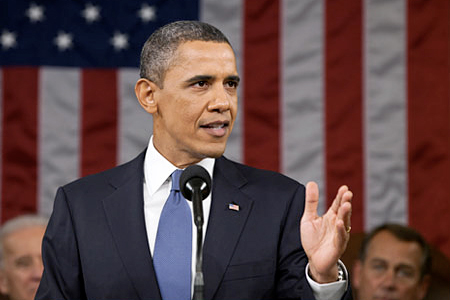Last night’s State of the Union was considerably better than I expected, in substance and in tone, mainly because my expectations for these things are extremely low. It was a policy laundry list, but not just a list — Obama had his dander up. By the end, after the chants of “they deserve a vote,” it was downright rousing.
(By the way, that bit on gun safety legislation? That’s what it looks like when Obama is personally, viscerally invested in an issue.)
The most surprising thing in the speech, at least to us cap-and-trade obsessives, was this line:
I urge this Congress to pursue a bipartisan, market-based solution to climate change, like the one John McCain and Joe Lieberman worked on together a few years ago.
Never in a million years did I think Obama would reference cap-and-trade, much less endorse it. I would have (er, did) bet money against it. But I’m happy to be wrong. It makes no difference at all in the grand scheme of things, but it tickles me to no end.
Anyway, on climate and energy, what we heard was an evolution of the same basic policy Obama has been pushing for years: reduce fossil fuel consumption and increase fossil fuel production.
Whatever you think of that dual policy — a politically savvy compromise, an untenable hypocrisy, a little of both — what we heard last night was simply a sharper, more ambitious version of it. It will be Obama’s climate and energy legacy, for better or worse.
On the “use less fossil fuels” front, there were three bold and interesting proposals (which has to be some kind of record for a SOTU):
1. Use executive power.
He said:
… if Congress won’t act soon to protect future generations, I will. I will direct my Cabinet to come up with executive actions we can take, now and in the future, to reduce pollution, prepare our communities for the consequences of climate change, and speed the transition to more sustainable sources of energy.
This is pretty vague and could mean all sorts of things. But I wrote a post the other day about all the things Obama could do with executive authority and it’s a pretty substantial list. If he follows on this in a meaningful way — in particular, if he directs EPA to develop ambitious carbon standards for existing power plants — he could take a serious bite out of carbon emissions.
And it’s the executive stuff he can do on his own. For everything else, he needs Congress.
2. Create an Energy Security Trust.
According to the blueprint [PDF] released by the White House, the Energy Security Trust would be “funded by revenue from oil and gas development on federal lands and offshore” and “is focused around one achievable goal: shifting our cars and trucks off oil.” Sweet!
The EST proposal has been floating around since 2007. It’s a great idea, but let’s face it, it’s basically a carbon tax, which makes passage through this Congress … challenging.
[UPDATE: I mischaracterized the EST. It’s not actually a carbon tax at all. What would happen is, the revenue oil and gas companies are already paying to explore and drill on federal land would be redirected into this fund. So there would be no increased costs to the companies, or to consumers. Maybe Congress will give it a chance after all! More details on the EST here (PDF).]
3. Double energy productivity by 2030.
This idea is taken straight from a piece of work I mentioned the other day: the Energy 2030 report from the Alliance Commission on National Energy Efficiency Policy. The White House blueprint explains it in somewhat more detail:
The President is laying out a bold but achievable goal to slash energy waste through increased efficiency. Modeled after a successful Administration approach in education reform, which was designed to promote forward-leaning policy adoption at the state level, the President’s Budget will include Race to the Top awards. These awards will support state governments that implement effective policies that increase energy efficiency and help decrease waste. Not only will increased efficiency save consumers money, the resulting reforms will drive investments that enhance manufacturing competitiveness, improve grid resiliency, and cut carbon pollution.
I’m a big fan of this idea, though of course the devil’s in the details. Rather than prescribing how to increase efficiency, it allows states to experiment and innovate; it rewards them for performance, not process or policy specifics.
If it worked — if U.S. energy productivity doubled — the wonks over at the Rhodium Group estimate that it would reduce U.S. carbon emissions by 33 percent. That’s a big f’ing deal, as Joe Biden would say.
But of course this program requires money, and Congress holds the purse strings, and Congress is awful.
Bonus 4. Make the renewable energy Production Tax Credit refundable and permanent.
This wasn’t in the speech but it’s in the blueprint.
The Production Tax Credit is a federal tax incentive for producers of renewable energy. One problem with it is that it’s nonrefundable, which means it can’t reduce the tax liability of a clean energy company below zero. In other words, companies can only take advantage of it if they’re already profitable, with substantial tax liability. Smaller start-ups, many of which are not yet profitable, get nothing from it. Making the credit refundable is equivalent to making it a cash grant, which means any company, even the small, scrappy ones, can benefit from it. Much less money goes to tax lawyers and tax-equity investors, which means more goes to innovation and deployment.
According to a report from the Bipartisan Policy Center, cash grants are fully twice as effective as tax credits. And for another great explanation of why refundable credits are better for both taxpayers and the climate, see this report [PDF] from the Climate Policy Initiative.
This is a great idea, but it would have to be accomplished by Congress during tax reform, and Congress is … but I repeat myself.
——
Anyway, as I said, most of this is happy talk that will go nowhere in Congress. The thing to watch is executive actions like EPA standards. Those are where Obama has some power and discretion; how he uses them will reveal how serious he really is about protecting future generations.



